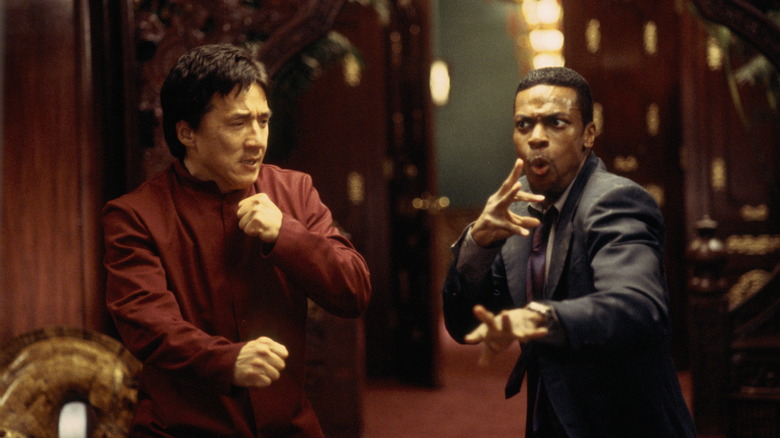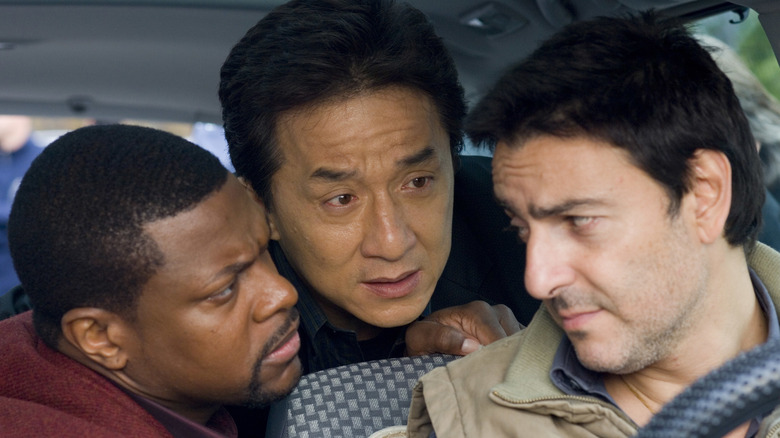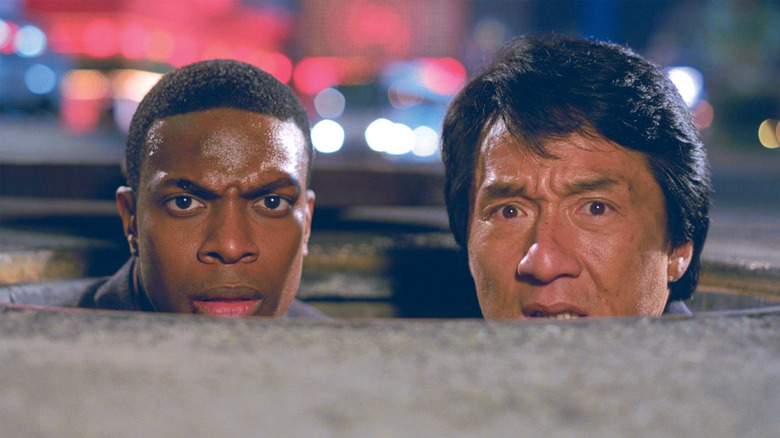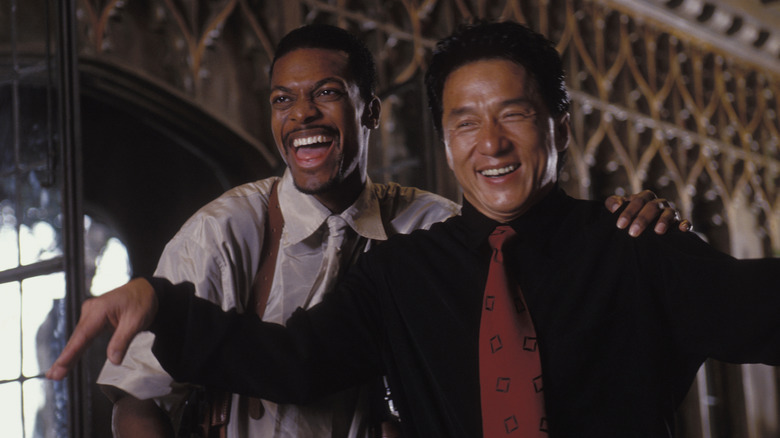Every Rush Hour Movie Ranked
There's an entire generation of movie lovers who first encountered Jackie Chan in the "Rush Hour" films. The actor, director and stuntsman didn't have a huge love for the franchise at the time, perhaps because they barely scratched the surface of what he was capable of as a choreographer. Still, his buddy cop films hold a special place in the hearts of countless action fans, and his rapport with co-star Chris Tucker isn't half bad, either.
The "Rush Hour" trilogy hasn't aged the best in the intervening years, thanks in part to its director, Brett Ratner, who was accused of sexual misconduct in 2017. The film's "East meets West" humor would also never fly today, making the franchise something of a time capsule for irreverent, 2000s humor. Still, we could never get enough of Chan and Tucker — that's why we're all still holding out for that potential "Rush Hour 4." While news on that front is few and far between, there's no better time to look back on the legacy of the films ... and figure out which of the three is the best.
3. Rush Hour 3
Is it any surprise that the worst "Rush Hour" film is also the one that has a Roman Polanski cameo? There are, admittedly, many problems in "Rush Hour 3" — but tapping a notorious predator for one of the most uncomfortable airport scenes ever made (he's a French agent that "inspects" our two heroes at Charles-de-Gaulle) is certainly indicative of the film's rotten core. Released in 2007, "Rush Hour 3" is your quintessential cash grab sequel. It tries to spice things up with a little change of scenery, reuniting Tucker's Detective Carter with Chan's Inspector Lee on an impromptu mission in Paris. The humor still walks the line between offensive and bold, and the chemistry between Tucker and Chan feels just as effortless. But the magic is largely gone, and not even Chan's trademark stunt-comedy is enough to get it back.
The premise is simple enough: Carter and Lee are tracking an assassin with ties to the Triads. Ratner is just as leery as ever in the City of Love, maybe even more so. The film is honestly more of an ogle-fest than it is another "East meets West" buddy-cop film. Bonus points for featuring a younger Hiroyuki Sanada ("Shōgun," "Bullet Train") as Kenji, a figure from Lee's past that only complicates his mission. Swedish legend Max von Sydow, best known for his partnership with director Ingmar Bergman, also co-stars for some reason — but no amount of genuine star power can make "Rush Hour 3" any less obnoxious. To quote one review at the time: "If Bergman hadn't just died, this probably would have killed him."
2. Rush Hour 2
"Rush Hour 2" essentially flips the premise of its predecessor, which saw Lee struggling to adapt to Western culture in Los Angeles. This time, he's back in his native Hong Kong, and Carter's the fish out of water. That gives the franchise the opportunity to feature some of the region's rising stars, like Zhang Ziyi — fresh off an incredible turn in "Crouching Tiger, Hidden Dragon" — and "The Last Emperor" star John Lone. Tucker is, once again, light on his feet, supplying some of the franchise's most quotable jokes (though not all of them have aged well).
At the time, Chan claimed that he wasn't given enough time to choreograph his stunts to the best of his ability — and though the action doesn't hit quite as hard as the original, "Rush Hour 2" remains a master class in staging. It was, after all, the film that gave us Kung Fu Kenny, Don Cheadle's scene-stealing persona that holds his own against Chan's Inspector Lee. Apart from that delightful cameo and a handful of quotable gags, though, "Rush Hour 2" isn't exactly memorable. As a sequel it definitely works, but that's largely because it takes the best parts of the first "Rush Hour" — its jokes, stunts, and premise — and just does it all over again.
1. Rush Hour
As far as the "Rush Hour" franchise is concerned, it doesn't get better than the original. If nothing else, the 1998 film made the game-changing choice to pair two very different stars at the respective heights of their capabilities. Chan, fresh off a big crossover hit with "Rumble in the Bronx," was finally breaking into Hollywood. Tucker, meanwhile, was on the come-up in the comedy scene. Their off-screen personas all but guaranteed the ideal odd-couple pairing: Tucker as the cocky motormouth, and Chan as the self-effacing expat who prefers to speak with his fists.
It'd prove to be a match made in movie heaven. The story, as always, isn't all that important, but it is one of the easiest to follow. When the daughter of the Chinese consul is kidnapped, Chan's Lee flies in from Hong Kong to aid in the investigation. He and Carter don't get along at all at first — they prefer to work alone, of course — and that's where most of the film's culture clash humor comes in. It's a crowd pleaser in every sense, and was instrumental in introducing Chan and his bonkers stunts to a wider audience.



